婚姻法 解释三 附英文
一夫一妻制、多妻制、重婚罪英文怎么说?
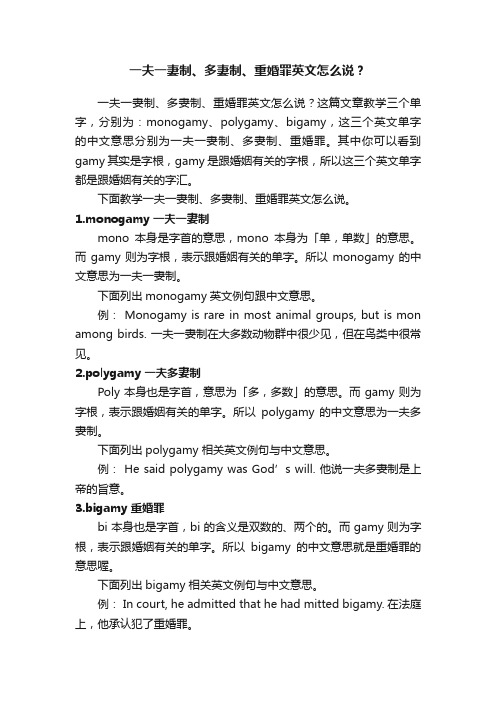
一夫一妻制、多妻制、重婚罪英文怎么说?一夫一妻制、多妻制、重婚罪英文怎么说?这篇文章教学三个单字,分别为:monogamy、polygamy、bigamy,这三个英文单字的中文意思分别为一夫一妻制、多妻制、重婚罪。
其中你可以看到gamy 其实是字根,gamy是跟婚姻有关的字根,所以这三个英文单字都是跟婚姻有关的字汇。
下面教学一夫一妻制、多妻制、重婚罪英文怎么说。
1.monogamy 一夫一妻制mono本身是字首的意思,mono本身为「单,单数」的意思。
而gamy则为字根,表示跟婚姻有关的单字。
所以monogamy的中文意思为一夫一妻制。
下面列出monogamy英文例句跟中文意思。
例: Monogamy is rare in most animal groups, but is mon among birds. 一夫一妻制在大多数动物群中很少见,但在鸟类中很常见。
2.polygamy 一夫多妻制Poly本身也是字首,意思为「多,多数」的意思。
而gamy则为字根,表示跟婚姻有关的单字。
所以polygamy 的中文意思为一夫多妻制。
下面列出polygamy 相关英文例句与中文意思。
例:He said polygamy was God’s will. 他说一夫多妻制是上帝的旨意。
3.bigamy 重婚罪bi本身也是字首,bi的含义是双数的、两个的。
而gamy则为字根,表示跟婚姻有关的单字。
所以bigamy的中文意思就是重婚罪的意思喔。
下面列出bigamy 相关英文例句与中文意思。
例: In court, he admitted that he had mitted bigamy. 在法庭上,他承认犯了重婚罪。
例: Bigamy is considered a crime in many countries. 重婚在许多国家被认为是犯罪。
一夫一妻英文, 一夫一妻制英文, 一夫多妻英文, 多妻制英文, 重婚罪英文。
夫妻婚后约法三章模板
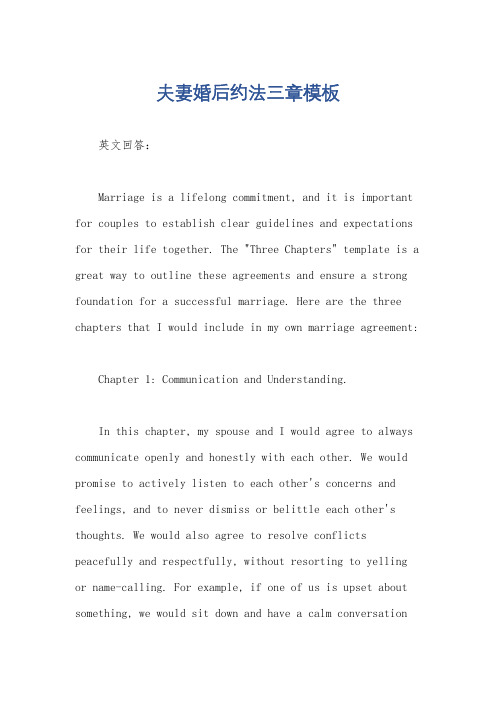
夫妻婚后约法三章模板英文回答:Marriage is a lifelong commitment, and it is important for couples to establish clear guidelines and expectations for their life together. The "Three Chapters" template is a great way to outline these agreements and ensure a strong foundation for a successful marriage. Here are the three chapters that I would include in my own marriage agreement:Chapter 1: Communication and Understanding.In this chapter, my spouse and I would agree to always communicate openly and honestly with each other. We would promise to actively listen to each other's concerns and feelings, and to never dismiss or belittle each other's thoughts. We would also agree to resolve conflicts peacefully and respectfully, without resorting to yelling or name-calling. For example, if one of us is upset about something, we would sit down and have a calm conversationto understand each other's perspectives and find a solution together.Chapter 2: Partnership and Support.In this chapter, my spouse and I would commit to being equal partners in our marriage. We would agree to share the responsibilities and duties of running a household, such as cooking, cleaning, and taking care of the children. We would also promise to support each other's personal goals and dreams, whether it's pursuing a career change or starting a new hobby. For instance, if one of us wants to go back to school, the other would provide emotional and practical support, such as helping with childcare or household chores.Chapter 3: Love and Affection.In this chapter, my spouse and I would prioritize maintaining a loving and affectionate relationship. We would promise to express our love and appreciation for each other regularly, through both words and actions. We wouldalso agree to make time for each other, whether it's going on regular date nights or simply spending quality time together at home. For example, we might surprise each other with small gestures of love, like leaving a sweet note or planning a special weekend getaway.中文回答:夫妻之间的婚姻是一生的承诺,为了确保婚姻的成功,夫妻双方需要在婚后建立清晰的规则和期望。
法律英语:婚姻法 3 家庭关系
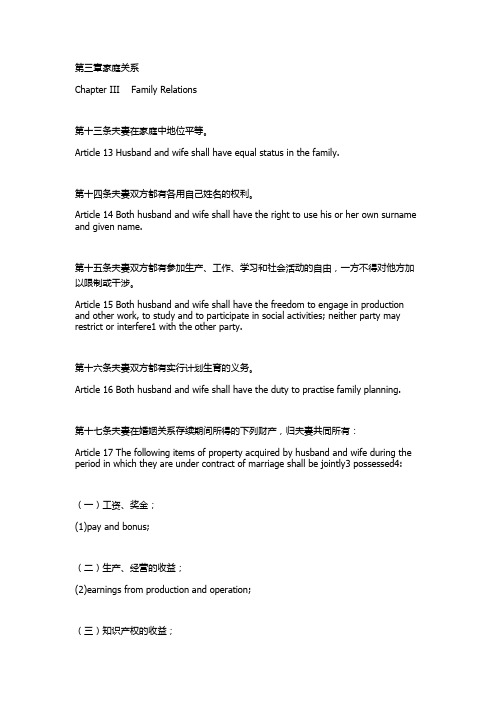
第三章家庭关系Chapter III Family Relations第十三条夫妻在家庭中地位平等。
Article 13 Husband and wife shall have equal status in the family.第十四条夫妻双方都有各用自己姓名的权利。
Article 14 Both husband and wife shall have the right to use his or her own surname and given name.第十五条夫妻双方都有参加生产、工作、学习和社会活动的自由,一方不得对他方加以限制或干涉。
Article 15 Both husband and wife shall have the freedom to engage in production and other work, to study and to participate in social activities; neither party may restrict or interfere1 with the other party.第十六条夫妻双方都有实行计划生育的义务。
Article 16 Both husband and wife shall have the duty to practise family planning.第十七条夫妻在婚姻关系存续期间所得的下列财产,归夫妻共同所有:Article 17 The following items of property acquired by husband and wife during the period in which they are under contract of marriage shall be jointly3 possessed4:(一)工资、奖金;(1)pay and bonus;(二)生产、经营的收益;(2)earnings from production and operation;(三)知识产权的收益;(3)earnings from intellectual property rights;(四)继承或赠与所得的财产,但本法第十八条第三项规定的除外;(4)property obtained from inheritance of gift except as provided for in Article 18(3)of this Law; and(五)其他应当归共同所有的财产。
婚姻法 the law of marriage
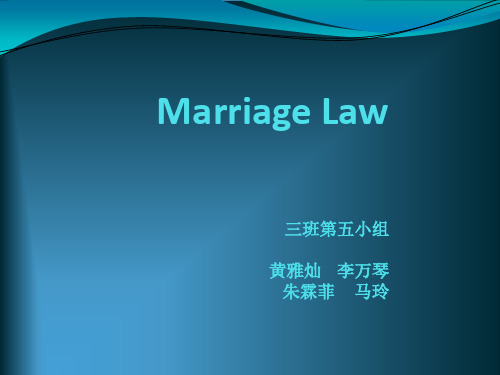
Kinship restrictions
The marriage laws of all countries restrict the relatives
a person is allowed to marry, though the degree of prohibited relationship varies widely. In most countries, marriage between brothers and sisters is forbidden. Many countries maintain a standard of required distance (in both consanguinity(血亲关系) and affinity(姻亲关系)) for marriage.
The current law relating to marriage in China is the
Marriage Law of the People’s Republic of China 1980 as amended in April 2001. Under this law, marriage registration procedures are administered by the local civil affairs office, minzhengju, in each jurisdiction. Persons planning to marry should visit one of these offices for specific information. There will be a fee for this visit.
2014-9-7
Marriage
电台字母解释法
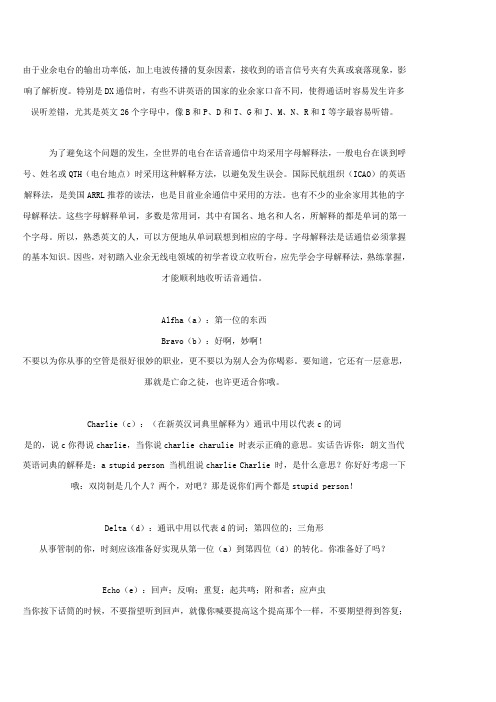
由于业余电台的输出功率低,加上电波传播的复杂因素,接收到的语言信号夹有失真或衰落现象,影响了解析度。
特别是DX通信时,有些不讲英语的国家的业余家口音不同,使得通话时容易发生许多误听差错,尤其是英文26个字母中,像B和P、D和T、G和J、M、N、R和I等字最容易听错。
为了避免这个问题的发生,全世界的电台在话音通信中均采用字母解释法,一般电台在谈到呼号、姓名或QTH(电台地点)时采用这种解释方法,以避免发生误会。
国际民航组织(ICAO)的英语解释法,是美国ARRL推荐的读法,也是目前业余通信中采用的方法。
也有不少的业余家用其他的字母解释法。
这些字母解释单词,多数是常用词,其中有国名、地名和人名,所解释的都是单词的第一个字母。
所以,熟悉英文的人,可以方便地从单词联想到相应的字母。
字母解释法是话通信必须掌握的基本知识。
因些,对初踏入业余无线电领域的初学者设立收听台,应先学会字母解释法,熟练掌握,才能顺利地收听话音通信。
Alfha(a):第一位的东西Bravo(b):好啊,妙啊!不要以为你从事的空管是很好很妙的职业,更不要以为别人会为你喝彩。
要知道,它还有一层意思,那就是亡命之徒,也许更适合你哦。
Charlie(c):(在新英汉词典里解释为)通讯中用以代表c的词是的,说c你得说charlie,当你说charlie charulie 时表示正确的意思。
实话告诉你:朗文当代英语词典的解释是:a stupid person 当机组说charlie Charlie 时,是什么意思?你好好考虑一下哦:双岗制是几个人?两个,对吧?那是说你们两个都是stupid person!Delta(d):通讯中用以代表d的词;第四位的;三角形从事管制的你,时刻应该准备好实现从第一位(a)到第四位(d)的转化。
你准备好了吗?Echo(e):回声;反响;重复;起共鸣;附和者;应声虫当你按下话筒的时候,不要指望听到回声,就像你喊要提高这个提高那个一样,不要期望得到答复;你的工作实际上是些重复性的简单劳动;你的苦虽然可以引起很多人的共鸣,但效果是“显而不易见”的;建议你还是去做应声虫或领导的附和者。
浅谈《婚姻法》汉英文本语篇分析及文化义探究
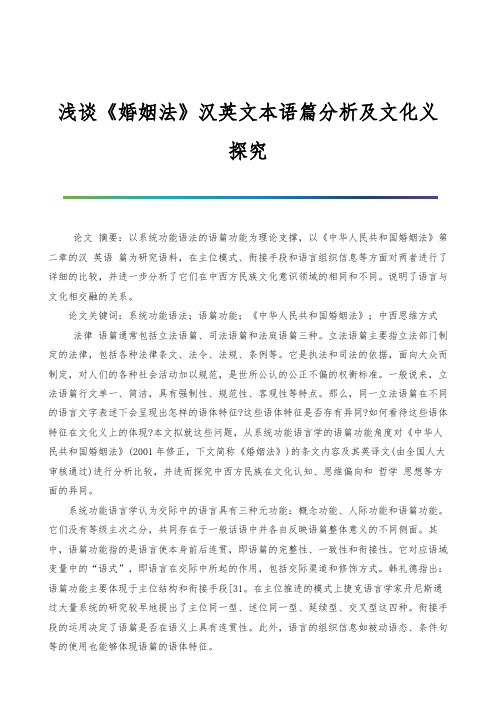
浅谈《婚姻法》汉英文本语篇分析及文化义探究论文摘要:以系统功能语法的语篇功能为理论支撑,以《中华人民共和国婚姻法》第二章的汉英语篇为研究语料,在主位模式、衔接手段和语言组织信息等方面对两者进行了详细的比较,并进一步分析了它们在中西方民族文化意识领域的相同和不同。
说明了语言与文化相交融的关系。
论文关键词:系统功能语法;语篇功能;《中华人民共和国婚姻法》;中西思维方式法律语篇通常包括立法语篇、司法语篇和法庭语篇三种。
立法语篇主要指立法部门制定的法律,包括各种法律条文、法令、法规、条例等。
它是执法和司法的依据,面向大众而制定,对人们的各种社会活动加以规范,是世所公认的公正不偏的权衡标准。
一般说来,立法语篇行文单一、简洁,具有强制性、规范性、客观性等特点。
那么,同一立法语篇在不同的语言文字表述下会呈现出怎样的语体特征?这些语体特征是否存有异同?如何看待这些语体特征在文化义上的体现?本文拟就这些问题,从系统功能语言学的语篇功能角度对《中华人民共和国婚姻法》(2001年修正,下文简称《婚姻法》)的条文内容及其英译文(由全国人大审核通过)进行分析比较,并进而探究中西方民族在文化认知、思维偏向和哲学思想等方面的异同。
系统功能语言学认为交际中的语言具有三种元功能:概念功能、人际功能和语篇功能。
它们没有等级主次之分,共同存在于一般话语中并各自反映语篇整体意义的不同侧面。
其中,语篇功能指的是语言使本身前后连贯,即语篇的完整性、一致性和衔接性。
它对应语域变量中的“语式”,即语言在交际中所起的作用,包括交际渠道和修饰方式。
韩礼德指出:语篇功能主要体现于主位结构和衔接手段[31。
在主位推进的模式上捷克语言学家丹尼斯通过大量系统的研究较早地提出了主位同一型、述位同一型、延续型、交叉型这四种。
衔接手段的运用决定了语篇是否在语义上具有连贯性。
此外,语言的组织信息如被动语态、条件句等的使用也能够体现语篇的语体特征。
从语言与文化的关系上说,语言的大部分内容包括在文化之中,语言与文化之间是一种交叉关系151。
婚姻法名词解释的英文翻译
婚姻法名词解释的英文翻译Marriage Law Terminology: English Translations for UnderstandingIntroduction:Marriage, as a vital institution in every society, holds immense significance in the lives of individuals. It is a complex institution that involves legal, emotional, and social aspects, which vary across cultures. In this article, we aim to provide English translations for key terms in the field of marriage law. By understanding these terms, individuals can gain insights into the legal framework surrounding marriage.1. Marriage Registration - 婚姻登记Marriage registration is the process through which a marriage is legally recognized by the government. It involves filing the necessary documents, providing proof of eligibility, and obtaining a marriage certificate. This certificate serves as legal evidenceof the marriage.2. Pre-Marital Agreement - 婚前协议A pre-marital agreement, often referred to as a prenuptial agreement or a prenup, is a contract between prospective spouses that outlines how their property, assets, and other matters would be divided in the event of divorce, separation, or death. It helps to clarify financial expectations and protect individual interests.3. Marital Property - 夫妻共同财产Marital property refers to assets and debts acquired by a couple during their marriage. In many jurisdictions, marital property is subject to equitable distribution upon divorce or separation. It includes real estate, investments, savings accounts, vehicles, and other possessions acquired jointly during the marriage.4. Child Custody - 子女抚养权Child custody refers to the legal authority given to a parent to make decisions regarding the upbringing and well-being of a child. This includes decisions about education, healthcare, religion, and general welfare. Custody may be awarded solely to one parent (sole custody) or shared between both parents (joint custody).5. Alimony - 赡养费Alimony, also known as spousal support or maintenance, refers to payments made by one spouse to the other after a divorce or legal separation. It is typically provided to ensure the financial well-being of the receiving spouse, especially if there is a significant disparity in income or one spouse has been economically dependent on the other.6. Divorce - 离婚Divorce is the legal dissolution of a marriage, ending the marital union, and releasing both parties from their marriage obligations. It involves the court process, where issues such as child custody, division of assets, and spousal support are resolved. Grounds for divorce vary across jurisdictions and may include irreconcilable differences, infidelity, or abuse.7. Annulment - 宣告婚姻无效An annulment is a legal declaration that a marriage was invalid from the beginning, making it void or null. Unlike divorce, which dissolves a valid marriage, an annulment states that there was no valid marriage to begin with due to factors like fraud, bigamy, underage marriage, or lack of mental capacity.8. Domestic Violence - 家庭暴力Domestic violence refers to abusive behavior within a household that harms the physical, emotional, or psychological well-being of a family member. It can occur between spouses, parents and children, or any other family members. Domestic violence is a serious crime and can lead to legal protection orders, temporary or permanent separation, and criminal charges.Conclusion:Understanding the terminology associated with marriage law is crucial for individuals navigating the complexities of marital relationships. Armed with knowledge of these terms, people can make informed decisions regarding their marriages, seek legal advice when necessary, and protect their rights and interests. However, it is essential to remember that legal systems and terminology may vary across countries and jurisdictions; hence, it is advisable to consult local resources or legal professionals for accurate information.。
【婚姻法司法解释二】中英双语
Interpretation of the Supreme People’s Court about Several Problems Concerning the Application of the Marriage Law of the People’s Republic of China (II)(December 26, 2003)With a view to correctly hearing the cases of disputes over marriage and families, the following interpretation is made about the relevant problems concerning the application of the Marriage Law by the people’s court in accordance with the Marriage Law of the People’s Republic of China (hereinafter referred to as the Marriage Law), the Civil Procedural Law of the People’s Republic of China and other relevant laws and regulations:Article 1 The people’s court shall refuse to accept any lawsuit filed by the parties concerned to stop the cohabitation. But, if the parties concerned plead to stop the "cohabitation between a person who has a spouse but co-habitats with a third person" as provided for in Articles 3, 32 and 46 of the Marriage Law, the people’s court shall accept such lawsuits and stop the cohabitation in accordance with the law.The people’s court shall accept the lawsuits filed by the parties concerned due to disputes over the partitioning of property or the upbringing of children.Article 2 After the people’s court has accepted a pleading for announcing a marriage invalid, if it finds, upon examination, that the circumstance is true, it shall make a judgment announcing the marriage invalid in accordance with the law. If the plaintiff pleads for withdrawing the lawsuit, he (she) shall be disapproved.最高人民法院公告(相关资料: 地方法规4篇案例1篇裁判文书1244篇相关论文26篇实务指南)《最高人民法院关于适用<中华人民共和国婚姻法>若干问题的解释(二)已于2003年12月4日由最高人民法院审判委员会第1299次会议通过。
有关法律方面的英文词汇
一、法律类1.单词Aacceptance /ək septəns/ n.受理accusation /ækju(:)zeiʃən/ n.检举accused /əkju:zd/ n.被告acquit / əkwit/ v.宣告…无罪acquittal / əkwitl/ n. 宣告无罪action / ækʃən / n.诉讼adjourn /ədʒə:n/ v. (使)休庭agent /eidʒənt/ n.代理人alibi /æli bai/ n.不在现场证明allegation /æliɡeiʃən/ n.声称amnesty /æmnesti/n. 大赦appeal /əpi:l/ n.上诉appearance /əpiərəns/ n. 投案appellant /əpelənt/ n.上诉人arbitration /ɑ:bi treiʃən/ n.仲裁assault /əsɔ:lt/ n.殴打attachment /ətætʃmənt/ n.扣押Bbail /beil/ v.&n.保释,保释金bailiff /beilif/ n. 法警bankruptcy /bæŋkrʌpsi/ n.破产bigamy /biɡəmi/ n. 重婚binding /baindiŋ/ a. 有约束力的bribery /braibəri/ n.贿赂Ccase /keis/ n.案件charge /tʃɑ:dʒ/ v.扺押citizen /sitizən/ n.公民collaborate /kəlæbəreit/ v. 串通commit /kəmit/ v.犯罪confess /kən fes/ v.成认,供认conspire /kən spaiə/ v. 合谋contract /kɔntrækt/n. 合约conveyancing /kən veiənsiŋ/n.产权转让convict /kən vikt/ v.& n.宣判有罪,犯人court /kɔ:t/ n.法院creditor /kreditə/ n. 债权人crime /kraim/ n.犯罪custody /kʌstədi/ n. 监护(权),关押Ddecree /di kri:/ n. 法令deed /di:d/ n.契据defamation /defəmeiʃən/ n.诽谤defendant /di fendənt/ n .被告defender /di fendə/ n. 辩护人defense /di fens/ n.辩护deposit /di pɔzit/ n. 定金determination /di tə:mi neiʃən/ n. 判决determine /dis tʃɑ:dʒ/ v.解除discharge /dis tʃɑ:dʒ/ v. 清偿Eevidence /evidəns/ n.证据execution /eksi kju:ʃən/ n.依法处决Fforthwith /fɔ:θwiθ/ad. 立即freeze /fri:z/ v. 冻结Gguarantor /ɡærən tɔ:/ n.担保人Hhearing /hiəriŋ/n.听证会Iidentification /ai dentifi keiʃən/ n.鉴定illegal /i li:ɡəl/ a.非法indictment /in daitmənt/ n.控告infringement /in frindʒmənt/ n. 侵犯权利instigate /instiɡeit/ v. 教唆intention /in tenʃən/ n.动机Jjaywalk /dʒeiwɔ:k/ v.违规穿越马路judge /dʒʌdʒ/ n.法官judgement /dʒʌdʒmənt/ n. 判决juror /dʒuərə/ n.陪审员jury /dʒuəri/ n. 陪审团Llapse /læps/n. 失去时效lawsuit /lɔ:sju:t/ n. 诉讼legitimate /li dʒitimit/ a. 合法的lien /li:ən/ n. 留置权,扣押权litigant /litiɡənt/ n. 诉讼当事人litigate /litiɡeit/ v.提出诉讼litigation /litiɡeiʃən/ n.诉讼Mmaintenance /meintinəns/ n.扶养费mediate /mi:dieit/ vi. 调解medicolegal /medikəu li:ɡəl/ n.法医misconduct /mis kɔndʌkt/ n. 失职行为mortgage /mɔ:ɡidʒ/ n. 抵押借款motive /məutiv/ n.动机Ooffender /əfendə/ n. 犯罪分子omission /əu miʃən/ n. 不作为order /ɔ:də/ n. 裁定overdraft /əuvədrɑ:ft/ n. 透支overrule /əuvəru:l/ v. 推翻Ppardon /pɑ:dən/ v. 赦免parole /pərəul/ n. 假释party /pɑ:ti/ n. 合约一方patent /peitənt/ n. 专利,专利权perjury /pə:dʒəri/ n. 伪证plaintiff /pleintif/ n. 原告pledge /pledʒ/ n.抵押品procurator /prɔkjuəreitə/ n.检察官procuratorate /prɔkjuəreitərit/ n. 检察院property /prɔpəti/ n. 产权prosecute /prɔsikju:t/ v.起诉Qquantum /kwɔntəm/ n. 赔偿金额Rrecess /ri ses/ n.休庭reconciliation /rekənsili eiʃən/ n. 和解remand /ri mɑ:nd/ n.&v. 案件发回remorse /ri mɔ:s/ n. 悔改reply /ri plai/ n. 批复report /ri pɔ:t/ v. 举报restitution /resti tju:ʃən/ n. 返复原主resume /ri zju:m/ v.恢复ruling /ru:liŋ/n. 裁决Sseal /si:l/ n. 印章search /sə:tʃ/ n&v. 搜查seize /si:z/ v.缴获sentence /sentəns/ n. 判决service /sə:vis/ v.送达smuggle /smʌɡl/ v.走私speeding /spi:diŋ/n.超速successor /sək sesə/ n.继承人sue /sju:/ v.起诉summon /sʌmən/ n.&v.传票,传唤surveillance /sə:veiləns/ n. 监视Ttestify /testifai/ v. 做证trespass /trespəs/ v. 侵越trust /trʌst/ n. 信托Uunassisted /ʌnəsistid/ a. 不予支持的Vverify /verifai/ v.核实victim /viktim/ n.被害人violate /vaiəleit/ v.触犯void /vɔid/ a.不具有法律效力的Wwarranty /wɔrənti/ n.保证will / wil/ n. 遗嘱withdrawal /wiðdrɔ:əl/ n.撤回2.词组:absolute discharge无条件释放accessory penalties附加刑act under the law法律行为actus reus犯罪行为administrative proceedings行政诉讼admitted evidence采信的证据affirm defence 积极的抗辩agency hearing 听证会agent ad litem诉讼代理人appear in court出庭approval of arrest批准逮捕arrestable offence可逮捕的罪行assembly and association集会结社breach of contract不履行合同burden of proof举证责任capital punishment极刑chief judge of a tribunal法庭庭长chief justice首席大法官chief procurator首席检察官circumstantial evidence旁证civil action民事诉讼civil case民事案件civil tribunal民事审判庭clear up a criminal case破案collegial panel合议庭commit a crime犯罪common law普通法community property夫妻共同财产conclusion of a lawsuit诉讼终止concurren sentence合并判决confession of one’s offence坦白confession to justice自首conspiratorial swindling合谋诈骗contempt of court 藐视法庭罪continental law大陆法court announcement法院公告court clerk书记员court debate法庭辩论court of final appeal终审法院crack down on counterfeit goods打假abducting and trafficking human beings拐卖人口concealing the murder包庇crime of dereliction of duty渎职罪disrupting the order of social administration妨害社会管理秩序drug trafficking贩卖毒品intentional homicide成心杀人intentional injury成心伤害interference with public administration妨害公务selling bogus medicines贩卖假药unlawful detention非法拘禁criminal capacity刑事责任能力criminal case刑事案件criminal detention刑事拘留criminal fine罚金criminal proceedings刑事诉讼criminal suspect犯罪嫌疑人cumulative punishment数罪并罚currency swap套汇de facto marriage事实婚姻death penalty死刑defense attorney辩护律师deprivation of political right剥夺政治权利deputy chief procurator大检察官detention house拘留所dismiss a motion驳回请求domestic litigation国内诉讼driving while intoxicated酒醉后驾驶first offense初犯economic crimes经济犯罪economic law经济法economic tribunal经济审判庭employment contract雇佣合同ex parte单方execution of arrest执行逮捕exemption from criminal penalty免于刑事处分expert conclusion鉴定结论extort bribe索取贿赂false imprisonment非法禁锢filing of a lawsuit起诉final award最后裁决书finding of guilty有罪判决fixed-term imprisonment有期徒刑foreman of jury 陪审团主席forfeiture of property没收财产fugitive criminal逃犯grave circumstances情节严重handle a case办案hit and run肇事后逃离现场illegal business违法经营illegal parking违规停车illegitimate child非婚生子女impose a fine罚款incapacity for act无行为能力incidence of criminal cases发案率incompetent for civil conduct无民事行为能力ineffective act 无效行为initiate legal proceeding打官司institute a public prosecution检控institute a public prosecution提起公诉intellectual property rights知识产权inter parte双方international litigation国际诉讼investigate and collect evidence调查取证joint offence共同犯罪joint property of the spouses夫妻共同所有财产justifiable right正当防卫juvenile delinquency青少年犯罪juvenile prison少管所law of contract合同法law office律师事务所lawyer fee律师费legal aid法律援助legal basis法律依据legal consultants法律参谋legal consulting法律咨询legal guardian法定监护人legal opinions法律意见书legal representative法人代表life imprisonment无期徒刑lighter punishment从轻处分liquidated damages违约金litigation costs诉讼费litigation fee案件受理费losing party败诉方marriage law婚姻法marriage registration结婚登记material evidence物证mediation agreement调解书mode of court trial庭审方式natural child亲生子女nature of case案由negligent driving不小心驾驶notarial certificate公证书notice of court session开庭通知open a court session开庭审理particulars of offense犯罪事实penal servitude拘役personal property个人财产personnel handling a case办案人员plead guilty认罪plead not guilty不认罪police station派出所possessory title 土地占有权power of attorney委托书preserve evidence证据保全presiding judge审判长proclamation of a person as dead宣告死亡proclamation of a person as missing宣告失踪properties division财产分割property of ownerless无主财产property right in real estate房屋的产权property right财产所有权public hearing公开审理public order公共秩序public security bureau公安局public security officers公安人员public surveillance管制publicsecurity organs公安机关pyramid selling传销reason for decision定案理由reckless driving鲁莽驾驶record of inquest勘验笔录record of interrogation讯问笔录record of investigation调查笔录reduced punishment减轻处分reject an appeal驳回上诉report a case报案rescind the original judgement 撤销原判residential surveillance监视居住revoke a case placed on file撤销立案right in succession继承权right of disposing处分权roperty relations产权关系seal up查封security administration治安管理security regulations治安条例severe punishment从重处分special pardon特赦specific performance 强制履行spousal relationship夫妻关系spousal support赡养spreading poison with intent成心投毒statement of case案情陈述书summon by force拘传supplementary civil action附带民事诉讼suspended sentence缓刑suspension of a lawsuit诉讼中止suspension of execution缓期执行sustain the original judgement维持原判take an oath宣誓tax evasion 逃税term in custody羁押期限termination of contract解除合同territorial jurisdiction地区管辖the bail pending trial with restricted liberty of moving取保候审The Supreme People’s Court最高人民法院The Supreme People’s Procuratorate最高人民检察院time limit provided by law法定期限traffic violation交通违规trial in camera不公开审理trial in public公开审理trial of first instance一审trial of second instance二审unjust enrichment不当得利unjustifiable self-defense防卫过当voluntary surrender to justice自动投案wanted for arrest通缉winning party胜诉方二、环保类1.单词:acidification /əsidifi keiʃən/ n.酸化adsorption /æd sɔ:pʃən/ n. 吸附作用aerosol /ɛərəsɔl/ n. 气雾剂afforestation /əfɔris teiʃən/ n. 绿化造林bacterium /bæk tiəriəm/ n.细菌barren /bærən/ a. 贫瘠的biogas /baiəuɡæs/ n.沼气carcinogen /kɑ:sinədʒən/ n. 致癌物Celsius /selsjəs/ n. 摄氏的circulation /sə:kju leiʃən/ n. 循环conserve /kən sə:v/ v.保护contaminate /kən tæmineit/ v.弄脏decibel /desibel/ n.分贝deforestation /di fɔris teiʃən/ n. 滥砍滥伐森林degrade /diɡreid/ v.降解desertification /di zə:tifi keiʃən/ n. 沙漠化deterioration /di tiəriəreiʃən/ n.恶化drought /draut/ n.干旱dump /dʌmp/ n. 倾倒ecosystem /i:kəsistəm/ n. 生态系统ecotourism /i:kəu tuərizəm/ n. 生态旅游embankment /im bæŋkmənt/ n. 筑堤epidemic /epi demik/ n.流行病eutrophication /ju:trɔfi keiʃən/ n.富营养化extinction /iks tiŋkʃən/ n.灭绝Fahrenheit /færənhait/ n.华氏的filter /filtə/ n.过滤器glacier /ɡlæsjə/ n.冰川habitat /hæbitæt/ n.栖息地herbicide /hə:bisaid/ n. 除草剂humidity /hju:miditi/ n.湿度hurricane /hʌrikən/ n.飓风irreversible /iri və:səbl/ a. 不可挽回的latitude /lætitju:d/ n.纬度litter /litə/ n. 废弃物log /lɔɡ/ v.伐木longitude /lɔndʒitju:d/ n.经度methane /mi:θein/ n.甲烷micropollutant /maikrəu pəlu:tənt/ n.微污染物mining /mainiŋ/ n.采矿ooze /u:z/ vi.渗出organism /ɔ:ɡənizəm/ n. 有机物overexploitation /əuvər eksplɔi teiʃən/ n. 过度利用森林ozone /əuzəun/ n.臭氧pesticide /pestisaid/ n. 杀虫剂photosynthesis /fəutəu sinθəsis/ n. 光合作用poach /pəutʃ/ v. 偷猎poison /pɔizən/ n.毒物pollutant /pəlu:tənt/ n.污染物pollution /pəluʃən/ n. 污染precipitation /pri sipi teiʃən/ n. 某地区降雨等的量predator /predətə/ n. 食肉动物prey /prei/ n. 被捕食者prioritize /praiɔritaiz/ v. 优先考虑radiation /reidi eiʃən/ n.辐射reclaim /ri kleim/ v. 开垦recycling /ri:saikliŋ/ n. 回收release /ri li:s/ v.释放reuse /ri:ju:z/ v. 再利用revegetation /ri:vedʒi teiʃ/ n.植被恢复sedimentation /sedimen teiʃən/ n. 沉积seepage /si:pidʒ/ n.渗漏sewage /sjuidʒ/ n.污水smog /smɔɡ/ n.烟雾spillage /spilidʒ/ n. 泄漏toxicity /tɔk sisiti/ n. 毒性toxin /tɔksin/ n.毒素tragedy /trædʒidi/ n. 灾难transpiration /træn spi reiʃən/ n. 蒸腾作用trash /træʃ/ n. 废物tsunami /tsju:nɑ:mi/ n. 海啸typhoon /tai fu:n/ n.台风ultraviolet /ʌltrəvaiəlit/ n. 紫外线urbanization /ə:bənai zeiʃən/ n. 城市化vegetation /vedʒi teiʃən/n. 植物(总称); victim/viktim/ n.受灾者volcano /vɔl keinəu/ n. 火山waste /weist/ n. 废物2.词组:acid fog酸雾acid rain酸雨acoustic insulation material隔音材料adverse impact不利影响afforested areas绿化面积agricultural wastes农业废物air current气流air pollution concentration空气污染浓度airborne pollution大气污染alternative fuel代用燃料ambient air quality standard环境空气质量标准ambient quality standard环境质量标准Antarctic Circle南极圈Arctic Circle北极圈area pollution区域污染atmospheric absorption大气吸收atmospheric monitoring system大气监测系统atmospheric transport大气输运battery cars电动汽车battery disposal电池处理biological weapons生物武器carbon dioxide二氧化碳carbon monoxide一氧化碳carrying capacity of environment环境负荷centralized treatment plant集中处理厂chemical decontamination化学污染去除chemical weapons化学武器clean energy清洁能源cleaner production清洁生产commercial noise商业噪音composite pollution混合污染constructed wetland人工湿地cooling waters冷却水crop waste作物废物depleted uranium bomb贫铀弹desert locusts沙漠蝗虫disaster clean-up operations灾难清理作业disaster preparedness防灾准备disaster prevention防灾disaster relief灾难救援disposal sites处置场所domestic garbage家庭垃圾drinking water饮用水dust storm 沙尘暴eco-demonstration region生态示范区ecological forest生态林ecological forecasting 生态预报El Nino厄尔尼诺现象electric power plants发电厂emergency relief measures应急减灾措施emergency relief紧急救援emergency shelter应急避难所emission standard排放标准endangered wildlife濒危野生动物energy transformation能源转换energy utilization能源利用enriched uranium浓缩铀environmental accidents环境事故environmental contingency planning环境应急方案environmental degradation环境恶化environmental health hazards环境健康危害environmental impact assessments 环境影响评估environmental awareness环保意识environmental monitoring环境检测environmental sensitive area环境敏感地区environment-friendly agriculture生态农业environment-friendly products环保产品excess reclamation过度开垦exhaust purifier尾气净化器extinct species灭绝的物种fast-growing trees速生林flood control防洪food additives食品添加剂food contamination食品污染forest coverage森林覆盖率fossil fuels矿物燃料gas-fueled vehicles天然气汽车global warming全球变暖groundwater pollution地下水污染hazardous substances危险物质hazardous wastes危险废物health facilities卫生设施holiday resort 旅游胜地hospital wastes医院废物human exposure to pollutants人体接触污染物human-made disasters人为灾难hydrologic observatory水文观测站immunological diseases免疫疾病incineration of waste废物燃烧industrial dust discharge工业粉尘排放industrial effluents工业废水industrial emissions工业排放物industrial fumes工业烟尘industrial solid wastes工业固体废物inorganic pollutants无机污染物landscaping design for environmental purposes美化环境lead contamination铅污染lead-free gasoline无铅汽油liquefied gas液化气liquid wastes液体废物mine filling矿山回填mining wastes采矿废物motor vehicle exhaust汽车尾气排放municipal waste城市废物natural ecosystems自然生态系统natural habitats生存环境nature reserve自然保护区nitrate dioxide二氧化氮noise abatement噪音治理non-renewable resources不可再生资源nuclear safety核平安ocean dumping海洋倾倒oil residue recuperation残油回收oil spills石油泄漏ore deposits矿床organic pollutants有机污染物organic solvents有机溶剂origin of species物种起源ozone layer臭氧层persistent organic pollutants难降解有机污染物pesticide residue农药残留pharmaceutical wastes医药废物physical alterations自然改变plastic wastes塑料废物pollution abatement污染治理pollution by sulfur 硫污染pollution control technology污染控制技术pollution fines 污染罚款pollution monitoring污染监测pollution risk污染风险pollution sources污染源precipitation probability 降水概率protected areas保护区radiation effects辐射效应radiation protection辐射防护radiation sickness辐射病radioactive contamination放射性污染radioactive decontamination放射性污染去除radioactive substances放射性物质refuse incinerator垃圾焚化厂refuse landfill垃圾填埋场renewable resources可再生资源sand breaks防沙林sand dunes沙丘sanitary landfills卫生填埋scrap metals废金属sea level海平面sea outfall海洋排泄口sea water desalinization海水淡化seismic sea waves地震海浪septic tanks化粪池sewage disposal污水处置sewage treatment systems污水处理系统shifting cultivation林农轮作small-displacement vehicles小排量汽车smoke prevention防烟soil alkalization土壤盐碱化soil conservation土壤保持soil degradation土壤退化soil erosion土壤侵蚀solar radiation太阳辐射solid wastes固体废物soot emissions烟尘排放strip mining露天采矿sulfur dioxide 二氧化硫surface waters地表水temperate forests温带森林temperate woodlands温带林地thermal pollution热污染thermal sea power海洋热能throwaway bio-degradable plastic bags可降解一次性塑料袋tidal energy潮汐能toxic emission废气排放toxic substances有毒物质toxic waste有毒废物traffic noise交通噪音tsunami warning system海啸预警系统vicious cycle恶性循环waste conversion techniques废物转化技术waste disposal废物处置waste heat废热waste minimization废物最少化waste recovery废物回收waste use废物利用water and soil erosion水土流失water conservation节约用水water saving fixtures节水装置water shortage缺水white pollution白色污染wind breaks防风林wind energy风能wind erosion风蚀三、军事类1.单词:accommodation /əkɔmədeiʃən/ n. 生活舱alliance /əlaiəns/ n. 联盟ammunition /æmju niʃən/ n.弹药analog /ænəlɔɡ/ n.模拟annihilation /ənaiəleiʃən/ n.歼灭anthrax /ænθræks/ n. 炭疽(病)aperture /æpətjuə/ n. 孔径armada /ɑ:mɑ:də/ n.舰队arsenal /ɑ:sənəl/ n.军火库artillery /ɑ:tiləri/ n.大炮attacker /ətækə/ n.强击机attention /ətenʃən/ n.立正badge /bædʒ/ n. 奖章band /bænd/ n.多层铁丝网bandage /bændidʒ/ n.绷带barrel /bærəl/ n.炮管battalion /bətæljən/ n. 营battle /bætl/n.战斗battlefield /bæt(ə)lfi:ld/ n.战场battleship /bætl/ n.战列舰bayonet /beiənit/ n.刺刀bazooka /bəzu:kə/ n. 反坦克火箭筒beachhead /bi:tʃhed/ n. 滩头阵地beret /berei/ n. 贝蕾帽Blitz /blits/ n.闪电战blockade /blɔkeid/ n.封锁bomber /bɔmə/ n. 轰炸机brigade /briɡeid/ n. 旅camouflage /kæmuflɑ:ʒ/ n.伪装canister /kænistə/ n.霰弹筒cannon /kænən/ n. 火炮canteen /kæn ti:n/ n.军用水壶cantonment /kæn tu:nmənt/ n.驻扎captain /kæptin/ n. 上尉cartridge /kɑ:tridʒ/ n.子弹casualty /kæʒjuəlti/ n.伤亡catapult /kætəpʌlt/ n.舰载机起飞弹射装置cavalry /kævəlri/ n.骑兵chaplain /tʃæplin/ n.随军牧师cluster /klʌstə/ n. 集束炸弹cockpit /kɔkpit/ n.驾驶舱colonel /kə:nl/ n.上校commando /kəmɑ:ndəu/ n.突击队〔员〕company /kʌmpəni/ n.连concentration /kɔnsən treiʃən/ n. 集结conscript /kən skript/ v.征募contain /kən tein/ v. 钳制contingent /kən tindʒənt/ n. 小分队corvette /kɔ:vet/ n.护卫艇counterattack /kauntərətæk/n. 反攻, 还击court-martial /kɔ:t mɑ:ʃəl/ n.军事法庭cruiser /kru:zə/ n. 巡洋舰defense /di fens/ n. 防卫deploy /di plɔi/ v.部署destroyer /dis trɔiə/ n.驱逐舰deterrence /di terəns/ n.威慑disarmament /disɑ:məmənt/ n.裁军dismiss /dis mis/ v. 解散division /di viʒən/ n. 师echelon /eʃəlɔn/ n. 梯形编队encirclement /in sə:klmənt/ n. 包围,孤立化extremist /iks tri:mist/ n. 极端分子firepower /faiəpauə/ n. 火力fission /fiʃən/ n.〔原子的〕裂变formation /fɔ:meiʃən/ n.编队fortification /fɔ:tifi keiʃən/ n. 防御工事frigate /friɡit/ n.护卫舰fusion /fju:ʒən/ n. 核聚变guidance /ɡaidəns/ n. 制导hardware /hɑ:dwɛə/ n. 装备hegemonism /hiɡemənizəm/ n.霸权主义howitzer /hauitsə/ n.榴弹炮igniter /iɡnait/ v.点燃infrared /infrəred/ a. 红外线initiative /i niʃiətiv/ n.主动权intercept /intəsept/ v.拦截interceptor /intəseptə/ n. 拦截机joystick /dʒɔi stik/ n.操纵杆launch /lɔ:ntʃ/ v. 发射lay /lei/ v. 瞄准lieutenant /lef tenənt/ n. 中尉lift /lift/ v.空运litter /litə/ n. 担架load /ləud/ v.装弹lookout /lukaut/ n.警戒march /mɑ:tʃ/ v.进军missile /misail/ n.导弹mobilization /məubilai zeiʃən/ n.发动muzzle /mʌzl/ n. 枪口,炮口non-proliferation /nɔnprəu lifəreiʃən/ n.不扩散orbit /ɔ:bit/ n.轨道paratroop /pærətru:p/ n. (复数)空降部队parity /pæriti/ n.均势periscope /periskəup/ n. 潜望镜platoon /plətu:n/ n.排pullback /pulbæk/ n. 撤军regiment /redʒimənt/ n.团shrapnel /ʃræpnəl/ n.流霰弹silo /sailəu/ n. 发射井sonar /səunɑ:/ n.声纳squad /skwɔd/ n.班stronghold /strɔŋhəuld/ n. 要塞据点submarine /sʌbməri:n/ n. 潜艇surrender /sərendə/ v.投降terrorism /terərizəm/ n.恐怖主义terrorist /terərist/ n.恐怖主义者theater /θiətə/ n. 战区torpedo /tɔ:pi:dəu/ n. 鱼雷trajectory /trædʒiktəri/ n.飞行弹道2.词组:aerial refueling空中加油air assault 空袭air base空军基地air defense alerting device 防空预警装置air defense anti-missile system 防空反导弹系统air defense artillery 高射炮air defense防空air raid空袭airborne alert 空中警戒aircraft carrier航空母舰airland battle空降作战air-to-air missile空对空导弹air-to-surface missile空对地导弹all-out attack 全面进攻ammunition depot 弹药库ammunition store弹药舱amphibious force海陆空军amphibious landing两栖登陆amphibious tank水陆坦克anti-ballistic missile反弹道导弹anti-ship missile反舰导弹anti-sub torpedo反潜鱼雷anti-submarine missile反潜导弹anti-submarine vessel反潜舰armed helicopter武装直升机armor-piercing projectile 穿甲弹arms control 军备控制arms expansion 扩军arms race 军备竞赛arms reductions 军队裁减arms sales 武器销售at ease稍息atomic bomb 原子弹aviation personnel 航空兵bacteriological weapon 细菌武器balance of power 力量均势ballistic missile defense弹道导弹防御ballistic missile 弹道导弹battle plane战斗机biological and chemical weapons 生化武器blue alert空袭警报capital tank主战坦克cargo planes 运输机carpet bomb 地毯式轰炸chemical defense corps 防化兵civilian use 民用coast guard 海岸警卫队cold war冷战combat power战斗能力combat radius 作战半径command post战地指挥所communications satellite 通讯卫星conventional submarine 常规潜艇conventional weapons 常规武器count off报数cruise missile巡航导弹defense spending国防开支defense system analysis防御系统分析department of defense国防部depth charge深水炸弹director radar引导雷达dog fight 空中搏斗drag parachute减速伞dress right向右看齐early warning satellite预警卫星electronic fighter电子战机electronic reconnaissance satellite电子侦察卫星escort vessel护卫舰fall in集合fighter plane歼击机fleet depot ship舰队补给舰flight deck飞行甲板fuel bunker油料舱fuel tank燃油箱gasoline transport ship汽油运输船geo-synchronous satellite 地球同步卫星global positioning system 全球定位系统ground attack地面进攻group army 集团军guidance device制导装置guidance radar制导雷达guided-missile submarine导弹潜艇gun sight瞄准镜heavy tank重型坦克high explosive 高能烈性炸药high-speed reconnaissance plane高速侦察机hydrogen bomb氢弹intercontinental ballistic missile 洲际弹道导弹intercontinental missile洲际导弹intermediate range ballistic missile中程弹道导弹joint military drill联合军事演习joint operations联合作战junior officer 下级军官,尉官landing ship登陆舰launch vehicle 运载火箭launcher 发射装置launching guidance device发射制导装置launching tower发射塔launching tube发射管lead element 先头部队light bomber轻型轰炸机light tank轻型坦克long-range ballistic missile远程弹道导弹low earth orbit近地卫星low frequency低频machine gun机炮marine crop海军陆战队marine radar航海雷达maximum range 最大射程medium tank中型坦克medium-range ballistic missile中程弹道导弹medium-range missile中程导弹military bloc 军事集团military buildup 军事集结military communications satellite军用通讯卫星military hardware 武器装备military meteorological satellite军用气象卫星military satellite军事卫星military science 兵法,军事学military use 军用military vessel战舰mine sweeping vessel扫雷舰mine-sweeping helicopter扫雷直升机mine-sweeping tank扫雷坦克missile frigate导弹护卫舰missile speedboat导弹快艇moon craft 月球探测机mushroom cloud蘑菇状烟云mutual non-aggression 互不侵犯mutual non-interference 互不干预national defense 国防national security 国家平安national sovereignty 国家主权naval blockade海上封锁naval fleet海军舰队navigation radar导航雷达navigation satellite导航卫星neutral country 中立国nominal weapon 低威力核武器non-nuclear weapon states非核武器国家non-use assurance 不使用核武器保证nuclear deterrent 核威慑力量nuclear device 核装置nuclear proliferation 核扩散nuclear radiation 核辐射nuclear reactor 核反响堆nuclear testing 核试验nuclear weapon states 核武器国nuclear weapon-free zone 无核区nuclear-powered aircraft核动力航空母舰out of rank出列peaceful coexistence 和平共处reconnaissance satellite侦察卫星refueling stop 补给站regional disarmament 区域裁军remote sensing technology 遥感技术rocket engine 火箭发动机rocket launching site火箭发射场salvage vessel打捞回收船satellite communications vehicle卫星通信车sea depot ship海上补给船secretary of defense国防部长shock wave冲击波sighting device 瞄准器space station宇宙空间站special taskforce特种部队stealth bomber隐形轰炸机strategic bomber战略轰炸机strategic missile战略导弹:strategic nuclear weapon 战略核武器strategic offense 战略进攻submarine mine水雷surface to-surface missile地对地导弹surface-to-air missile地对空导弹survey vessel测量船tactical operation战术意图tanker aircraft空中加油机task force 特遣部队tender ship供给舰theater nuclear forces 战区核武器部队torpedo boat鱼雷艇trainer aircraft教练机transport plane运输机transport ship运输舰unilateral disarmament 单边裁军warning radar警戒雷达四、科技网络类1.单词:access /ækses/ n.访问activate /æktiveit/ v.激活attribute /ætribju:t/ n.属性audio/ɔ:djəu/ n.音频backup /bækʌp/ n.备份bandwidth /bændwidθ/ n. 带宽binary /bainəri/ a.二进制biochip /baiəutʃip/ n.生物芯片bioengineering /baiəu endʒi niriŋ/ n.生物工程biotechnology /baiəutek nɔlədʒi/ n. 生物技术bit /bit/ n.比特blog /blɔɡ/ n.博客bluetooth /blu:tu:θ/ n.蓝牙broad /brɔ:d/ n.宽带browse /brauz/ v.浏览bus /bʌs/ n. 总线byte /bait/ n.字节case /keis/ n.机箱chip /tʃip/ n. 芯片click /klik/ v.点击client /klaiənt/ n.计算机的用户clone /kləun/ n.克隆code /kəud/ n.密码command /kəmɑ:nd/ n.指令compatibility /kəm pæti biliti/ n.兼容configuration /kən fiɡju reiʃən/ n. 配置copy /kɔpi/ n.复制copyright /kɔpirait/ n.版权cruise /kru:z/ v.漫游cursor /kə:sə/ n. 光标cut /kʌt/ v.剪切database /deitəbeis/ n. 数据库debug /ˌdi:ˈbʌɡ/ v. 调试default /di fɔ:lt/ n.默认delete /di li:t/ v.删除demo /deməu/ n.演示desktop /desktɔp/ n. 桌上型的电脑digital /didʒitəl/ a.数字显示的download /daunləud/ v.下载driver /draivə/ n.驱动程序或驱动器execute /eksikju:t/ v.执行facilitate /fəsiliteit/ v.促进file /fail/ n. 文件folder /fəuldə/ n.文件夹font /fɔnt/ n. 字体format /fɔ:mæt/ v.硬盘扇区格式化gadget /ɡædʒit/ n. 小玩意gateway /ɡeitwei/ n.网关generator /dʒenəreitə/ n. 发电机graphics /ɡræfiks/ n.图形hacker /hækə/ n. 黑客hardware /hɑ:dwɛə/ n. 硬件hub /hʌb/ n. 集线器icon /aikɔn/ n. 图标image /imidʒ/ n.图像immunity /i mju:nəti/ n.免疫input /input/ n.输入install /in stɔ:l/ v. 安装interface intəfeis/ n. 界面invader /in veidə/ n.入侵者know-how /nəuhau/ n. 技能,专业知识laptop /læptɔp/ n. 笔记本电脑license /laisəns/ v. 许可证mainboard /mein bɔ:d/ n. 主板malfunction /mæl fʌŋkʃən/ n.故障manual /mænjuəl/ n.使用手册,指南menu /menju:/ n.菜单modem /məudem/ n.调制解调器monitor /mɔnitə/ n.监视器moonwalk /mu:n wɔ:k/ n. 太空行走multimedia /mʌlti mi:djə/ n.多媒体outage /autidʒ/ n.断电outlet /autlet/ n. 插座password /pɑ:swə:d/ n.口令paste /peist/ v. 粘贴piracy /pairəsi/ n. 盗版pixel /piksəl/ n.像素power /pauə/ n.电源program /prəuɡræm/ n. 程序release /ri li:s/ v. 发布resolution /rezəlu:ʃən/ n.分辨率restart /ri:stɑ:t/ v. 重新启动roam /rəum/ v.漫游router /rautə/ n.路由器scanner /skænə/ n.扫描仪serum /siərəm/ n. 血清server /sə:və/ n.效劳器socket /sɔkit/ n. 插槽,插座software /sɔftwɛə/ n. 软件static /stætik/ a.静电的supersonic /sju:pəsɔnik/ a.超音速的teleconference /telikɔnfərəns/ n. 会议template /templit/ n.模版text /tekst/ n. 文本transmission /trænz miʃən/ n. 传输,传送undo /ʌn du/ v. 撤消update /ʌp deit/ v.更新upgrade /ʌpɡreid/ v. 升级upload /ʌp ləud/ n. 上传up-to-date /ʌptədeit/ a. 最新的video /vidiəu/ n.视频videophone /vidiəufəun/ n. 可视virus /vaiərəs/ n.病毒webpage /web peidʒ/ n. 网页website /web sait/ n.网站workstation /wə:ksteiʃən/ n.工作站,连到效劳器的单个计算机X-ray /eksrei/ n. X光词组:ABS (anti-lock braking system) 防抱死系统agriculture industrialization农业产业化。
法律英语:婚姻法 2 结婚
第二章结婚Chapter II Marriage Contract第五条结婚必须男女双方完全自愿,不许任何一方对他方加以强迫或任何第三者加以干涉。
Article 5 Marriage must by based upon the complete willingness of both man and woman. Neither party may use compulsion on the other party and no third party may interfere1.第六条结婚年龄,男不得早于二十二周岁,女不得早于二十周岁。
晚婚晚育应予鼓励。
Article 6 No marriage may be contracted before the man has reached 22 years ofage and the woman 20 years of age. Late marriage and late childbirth shall be encouraged.第七条有下列情形之一的,禁止结婚:Article 7 No marriage may be contracted under any of the following circumstances:(一)直系血亲和三代以内的旁系血亲;(1)if the man and the woman are lineal relatives by blood, or collateral2 relatives by blood up to the third degree of kinship; and(二)患有医学上认为不应当结婚的疾病。
(2)if the man or the woman is suffering from any disease, which is regarded by medical science as rendering3 a person unfit for marriage.第八条要求结婚的男女双方必须亲自到婚姻登记机关进行结婚登记。
- 1、下载文档前请自行甄别文档内容的完整性,平台不提供额外的编辑、内容补充、找答案等附加服务。
- 2、"仅部分预览"的文档,不可在线预览部分如存在完整性等问题,可反馈申请退款(可完整预览的文档不适用该条件!)。
- 3、如文档侵犯您的权益,请联系客服反馈,我们会尽快为您处理(人工客服工作时间:9:00-18:30)。
《婚姻法》解释三(附英文)《最高人民法院关于适用〈中华人民共和国婚姻法〉若干问题的解释(三)》已于2011年7月4日由最高人民法院审判委员会第1525次会议通过,现予公布,自2011年8月13日起施行。
二○一一年八月九日法释〔2011〕18号最高人民法院关于适用《中华人民共和国婚姻法》若干问题的解释(三)(2011年7月4日最高人民法院审判委员会第1525次会议通过)为正确审理婚姻家庭纠纷案件,根据《中华人民共和国婚姻法》、《中华人民共和国民事诉讼法》等相关法律规定,对人民法院适用婚姻法的有关问题作出如下解释:第一条当事人以婚姻法第十条规定以外的情形申请宣告婚姻无效的,人民法院应当判决驳回当事人的申请。
当事人以结婚登记程序存在瑕疵为由提起民事诉讼,主张撤销结婚登记的,告知其可以依法申请行政复议或者提起行政诉讼。
第二条夫妻一方向人民法院起诉请求确认亲子关系不存在,并已提供必要证据予以证明,另一方没有相反证据又拒绝做亲子鉴定的,人民法院可以推定请求确认亲子关系不存在一方的主张成立。
当事人一方起诉请求确认亲子关系,并提供必要证据予以证明,另一方没有相反证据又拒绝做亲子鉴定的,人民法院可以推定请求确认亲子关系一方的主张成立。
第三条婚姻关系存续期间,父母双方或者一方拒不履行抚养子女义务,未成年或者不能独立生活的子女请求支付抚养费的,人民法院应予支持。
第四条婚姻关系存续期间,夫妻一方请求分割共同财产的,人民法院不予支持,但有下列重大理由且不损害债权人利益的除外:(一)一方有隐藏、转移、变卖、毁损、挥霍夫妻共同财产或者伪造夫妻共同债务等严重损害夫妻共同财产利益行为的;(二)一方负有法定扶养义务的人患重大疾病需要医治,另一方不同意支付相关医疗费用的。
第五条夫妻一方个人财产在婚后产生的收益,除孳息和自然增值外,应认定为夫妻共同财产。
第六条婚前或者婚姻关系存续期间,当事人约定将一方所有的房产赠与另一方,赠与方在赠与房产变更登记之前撤销赠与,另一方请求判令继续履行的,人民法院可以按照合同法第一百八十六条的规定处理。
第七条婚后由一方父母出资为子女购买的不动产,产权登记在出资人子女名下的,可按照婚姻法第十八条第(三)项的规定,视为只对自己子女一方的赠与,该不动产应认定为夫妻一方的个人财产。
由双方父母出资购买的不动产,产权登记在一方子女名下的,该不动产可认定为双方按照各自父母的出资份额按份共有,但当事人另有约定的除外。
第八条无民事行为能力人的配偶有虐待、遗弃等严重损害无民事行为能力一方的人身权利或者财产权益行为,其他有监护资格的人可以依照特别程序要求变更监护关系;变更后的监护人代理无民事行为能力一方提起离婚诉讼的,人民法院应予受理。
第九条夫以妻擅自中止妊娠侵犯其生育权为由请求损害赔偿的,人民法院不予支持;夫妻双方因是否生育发生纠纷,致使感情确已破裂,一方请求离婚的,人民法院经调解无效,应依照婚姻法第三十二条第三款第(五)项的规定处理。
第十条夫妻一方婚前签订不动产买卖合同,以个人财产支付首付款并在银行贷款,婚后用夫妻共同财产还贷,不动产登记于首付款支付方名下的,离婚时该不动产由双方协议处理。
依前款规定不能达成协议的,人民法院可以判决该不动产归产权登记一方,尚未归还的贷款为产权登记一方的个人债务。
双方婚后共同还贷支付的款项及其相对应财产增值部分,离婚时应根据婚姻法第三十九条第一款规定的原则,由产权登记一方对另一方进行补偿。
第十一条一方未经另一方同意出售夫妻共同共有的房屋,第三人善意购买、支付合理对价并办理产权登记手续,另一方主张追回该房屋的,人民法院不予支持。
夫妻一方擅自处分共同共有的房屋造成另一方损失,离婚时另一方请求赔偿损失的,人民法院应予支持。
第十二条婚姻关系存续期间,双方用夫妻共同财产出资购买以一方父母名义参加房改的房屋,产权登记在一方父母名下,离婚时另一方主张按照夫妻共同财产对该房屋进行分割的,人民法院不予支持。
购买该房屋时的出资,可以作为债权处理。
第十三条离婚时夫妻一方尚未退休、不符合领取养老保险金条件,另一方请求按照夫妻共同财产分割养老保险金的,人民法院不予支持;婚后以夫妻共同财产缴付养老保险费,离婚时一方主张将养老金账户中婚姻关系存续期间个人实际缴付部分作为夫妻共同财产分割的,人民法院应予支持。
第十四条当事人达成的以登记离婚或者到人民法院协议离婚为条件的财产分割协议,如果双方协议离婚未成,一方在离婚诉讼中反悔的,人民法院应当认定该财产分割协议没有生效,并根据实际情况依法对夫妻共同财产进行分割。
第十五条婚姻关系存续期间,夫妻一方作为继承人依法可以继承的遗产,在继承人之间尚未实际分割,起诉离婚时另一方请求分割的,人民法院应当告知当事人在继承人之间实际分割遗产后另行起诉。
第十六条夫妻之间订立借款协议,以夫妻共同财产出借给一方从事个人经营活动或用于其他个人事务的,应视为双方约定处分夫妻共同财产的行为,离婚时可按照借款协议的约定处理。
第十七条夫妻双方均有婚姻法第四十六条规定的过错情形,一方或者双方向对方提出离婚损害赔偿请求的,人民法院不予支持。
第十八条离婚后,一方以尚有夫妻共同财产未处理为由向人民法院起诉请求分割的,经审查该财产确属离婚时未涉及的夫妻共同财产,人民法院应当依法予以分割。
第十九条本解释施行后,最高人民法院此前作出的相关司法解释与本解释相抵触的,以本解释为准。
Interpretations of the Supreme People’s Court about Several Issues Concerning the Application of the Marriage Law of the People’s Republic of China (III)( Adopted at the1525th meeting, on July 4, 2011 by the Judicial Committee of the Supreme People’s Court )With a view to correctly hearing the cases of disputes over marriage and families, interpretations of relevant problems on the application of Marriage Law by people’s court of law are made as follow, according to Marriage Law of the PRC, Civil Procedure Law of the PRC and other relevant laws and regulations:Article 1 The court shall dismiss the application by a party concerned for the declaration of annulment of marriage according to the situations other than the one specified in the Article 10 of the Marriage Law of the People’s Republic of China,.In case a party concerned brings a civil action to claim revocation of marriage registration on the ground that the marriage registration process was flawed, they shall be informed that they may apply for administrative reconsideration or file an administrative lawsuit.Article 2 Where one party of the couple plead with the court to confirm the inexistence of parent-child relationship and has provided necessary evidences to prove it, while the other party does not have the opposite evidence but refuses to do the paternity test, the court may presume that the claim held by such party who pleads confirmation of inexistence of parent-child relationship is upheld..If one party pleads with the court to confirm parent-child relationship, and provides the necessary evidence to prove it, while the other party has no evidence to the contrary but refuses to do the paternity test, the court may presume that the claim held by such party who pleads confirmation of existence of parent-child relationship is upheld.Article 3 The court shall support the pleading for maintenance claimed by minor children or those children who can not live independently if both parents or one parent refuses to assume the obligation to support children during the existence of the matrimonial relationship.Article 4 The court shall not support the pleading to divide the community property made by a party of the couple during the existence of the matrimonial relationship, except for the following major reasons and without prejudice to the rights and interests of creditors:a) Where one party has the acts, including, without limitation, hiding, transferring, selling off, destructing, squandering property jointly owned or forging joint debts, which seriously damages the rights and interests in and to properties jointly owned by the couple.b) Where the people for whom one party concerned has statutory support obligations suffers from serious diseases and needs medical treatment, the other party does not agree to pay the medical expenses.Article 5 The revenue generated by one party’s personal property after marriage, except for Fructus and unearned increment , should be recognized as property jointly owned by the two parities in marriage.Article 6 Where the parties concerned have agreed that one party gives away his or her real property to the other party before or during the existence of the marriage, and then revokes the contract of gift before the registration of the gift real property has been changed, the other party pleads an order of specific performance, the people’s court may deal with the case in accordance with the provisions in Article 186 of the Contact Law.Article 7 Where the title of real estate bought by the parents of one party after marriage is registered in the name of the son or daughter of such parents, it is deemed to be donation to their son or daughter and thus to be the personal property of their son or daughter in accordance with the Article 18(3) of the Marriage Law of the People’s Republic of China. Where the purchase of real estate is financed by parents of both parties, and the title of the real property is registered in the name of one party, the property is deemed be property by jointly owne d in accordance with their parents’ respective share of contribution unless otherwise agreed by the parties.Article 8 In case the spouse of the person without capacity for civil conduct has any act, including, without limitation, abuse and abandonment, which jeopardizes the personal or property rights of the party without capacity for civil conduct, others with custody eligibility may plead a change in guardianship in compliance with special procedures; where the substituted guardian takes a divorce proceedings for the party without capacity for civil conduct, the court should accept it.Article 9 The court shall not support the pleading made by the husband for damages on the ground of unauthorized termination of pregnancy by his wife and infringement on his reproductive rights; where both husband and wife dispute over childbearing, resulting in actual rupture of emotion, if a party pleads a divorce, the people’s court shall deal with it in accordance with the provisions in Article 32(3) of the Marriage Law of the People’s Republic of China after mediation fails.Article 10 Where one party in the marriage has signed a real estate purchase contract before marriage, pays the down payment with his/her personal property, takes a loan from the bank, repays the bank mortgage with the community property of both parties after marriage and registers the real estate under the name of the payer of down payment, both parties shall dispose of the real estate by mutual agreement at the time of divorce.Where both parti es fail to reach an agreement based on the preceding paragraph, the people’s court may rule that such real estate vests in the party under whose name the real estate is registered and the loan outstanding thereof shall be the personal debt of such party. In respect of the loan repayment jointly paid by both parties after marriage and the corresponding property increment of the real estate, the party under whose name the real estate is registered shall make compensation to the other party at the time of divorce in accordance with the principle specified in Paragraph 1 of Article 39 of the Marriage Law of the People’s Republic of China.Article 11 Where one party in the marriage sells a house under co-ownership without the consent of the other party, the third person makes the purchase and payment in good faith with reasonable consideration and completes the property ownership registration formalities, the people’s court shall not uphold the claim made by the other party of the couple for the recovery of the house.(Where one party in the marriage disposes of the real estate under co-ownership without the consent of the other party, thereby resulting in the loss of the other party of the couple, and theother party claims for compensation of the loss, the peopl e’s count shall uphold such claim.) Article 12 During the existence of the marriage, Where both parties in the marriage make capital contribution to purchase a house under the housing reform scheme in the name of one party’s parent(s), the property ownership is registered under the name of such party’s parent, the people’s court shall not uphold the claim made by the other party for division of the house as their community property at the time of divorce. Such contribution for the purchase of a house may be treated as creditor’s rights.Article 13 Where one party in the marriage, at the time of divorce, has not retired and fails to meet the requirements for receiving endowment insurance benefits, the people’s court shall not uphold the claim of the other party for division of the endowment insurance benefits as their community property; where the endowment insurance premium is paid with the community property of both parties after marriage and one party makes a claim, at the time of divorce, for division of the portion in the pension account actually paid by him/her during the marriage as the community property of both parties, the people’s court shall uphold such cl aim.Article 14 Where the parties concerned have reached the property division agreement for the purpose of registered divorce or uncontest divorce filed with the court, but the two parties have failed to reach the divorce agreement and one party goes back on his or her words in the divorce proceedings, the court shall conclude that the agreement for the property division has not gone into effect, and divide the community property according to the actual situation. Article 15 Where in the duration of marriage, the estate that one party can inherit as one of heirs has not been distributed between heirs, and when suing for divorce, the other party requests for distribution the court shall inform the party that he or she should file another suit after the estate will be distributed between heirs .Article 16 lf a borrowing agreement has been concluded between husband and wife to have community property lend to a party for personal business activities, or for other personal matters, the agreement shall be deemed to be an act of disposal of community property as agreed upon. When filing a lawsuit for divorce, the dispute can be handled in accordance with provisions in the borrowing agreement.Article 17 Where both parties have the faults specified in Article 46 of the Marriage Law of the People’s Republic of China, the people’s court shall not support the claim made by either or both parties for damages for divorce against the other party.Article 18 After the divorce, if one party files to the court requesting splitting the undivided community property, and after verification that the property proves indeed to be the community property which has not been divided in divorce, the court shall divide it in accordance with the law.Article 19 After the implementation of these interpretations, if there are any discrepancies between these interpretations and previous relevant judicial interpretations made by the Supreme People’s Court and these interpretations shall prevail.。
